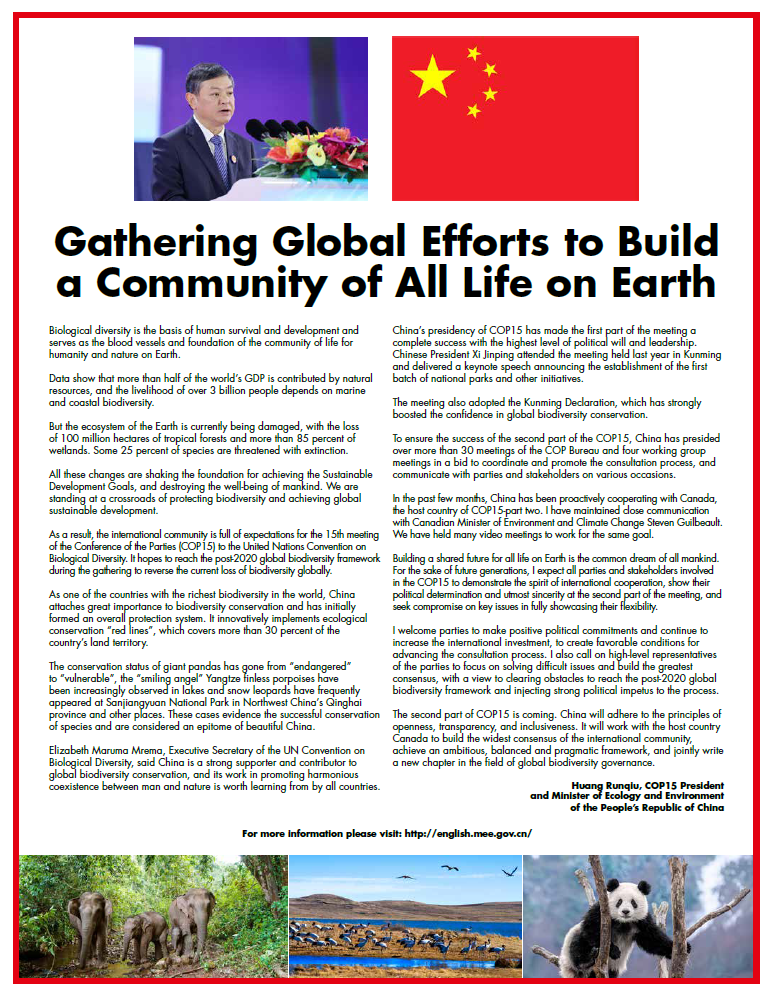COP15 President Huang Runqiu publishes a signed article on The Hill Times
On November 30, Huang Runqiu, UN Biodiversity Conference (COP 15) President and Minister of Ecology and Environment of the People’s Republic of China, published a signed article titled “Gathering Global Efforts to Build a Community of All Life on Earth” on The Hill Times. Here is the full text:

Biological diversity is the basis of human survival and development and serves as the blood vessels and foundation of the community of life for humanity and nature on Earth.
Data show that more than half of the world's GDP is contributed by natural resources, and the livelihood of over 3 billion people depends on marine and coastal biodiversity.
But the ecosystem of the Earth is currently being damaged, with the loss of 100 million hectares of tropical forests and more than 85 percent of wetlands. Some 25 percent of species are threatened with extinction.
All these changes are shaking the foundation for achieving the Sustainable Development Goals, and destroying the well-being of mankind. We are standing at a crossroads of protecting biodiversity and achieving global sustainable development.
As a result, the international community is full of expectations for the 15th meeting of the Conference of the Parties (COP15) to the United Nations Convention on Biological Diversity. It hopes to reach the post-2020 global biodiversity framework during the gathering to reverse the current loss of biodiversity globally.
As one of the countries with the richest biodiversity in the world, China attaches great importance to biodiversity conservation and has initially formed an overall protection system. It innovatively implements ecological conservation "red lines", which covers more than 30 percent of the country's land territory.
The conservation status of giant pandas has gone from "endangered" to "vulnerable", the "smiling angel" Yangtze finless porpoises have been increasingly observed in lakes and snow leopards have frequently appeared at Sanjiangyuan National Park in Northwest China's Qinghai province and other places. These cases evidence the successful conservation of species and are considered an epitome of beautiful China.
Elizabeth Maruma Mrema, Executive Secretary of the UN Convention on Biological Diversity, said China is a strong supporter and contributor to global biodiversity conservation, and its work in promoting harmonious coexistence between man and nature is worth learning from by all countries.
China's presidency of COP15 has made the first part of the meeting a complete success with the highest level of political will and leadership. Chinese President Xi Jinping attended the meeting held last year in Kunming and delivered a keynote speech announcing the establishment of the first batch of national parks and other initiatives.
The meeting also adopted the Kunming Declaration, which has strongly boosted the confidence in global biodiversity conservation.
To ensure the success of the second part of the COP15, China has presided over more than 30 meetings of the COP Bureau and four working group meetings in a bid to coordinate and promote the consultation process, and communicate with parties and stakeholders on various occasions.
In the past few months, China has been proactively cooperating with Canada, the host country of COP15-part two. I have maintained close communication with Canadian Minister of Environment and Climate Change Steven Guilbeault. We have held many video meetings to work for the same goal.
Building a shared future for all life on Earth is the common dream of all mankind. For the sake of future generations, I expect all parties and stakeholders involved in the COP15 to demonstrate the spirit of international cooperation, show their political determination and utmost sincerity at the second part of the meeting, and seek compromise on key issues in fully showcasing their flexibility.
I welcome parties to make positive political commitments and continue to increase the international investment, to create favorable conditions for advancing the consultation process. I also call on high-level representatives of the parties to focus on solving difficult issues and build the greatest consensus, with a view to clearing obstacles to reach the post-2020 global biodiversity framework and injecting strong political impetus to the process.
The second part of COP15 is coming. China will adhere to the principles of openness, transparency, and inclusiveness. It will work with the host country Canada to build the widest consensus of the international community, achieve an ambitious, balanced and pragmatic framework, and jointly write a new chapter in the field of global biodiversity governance.